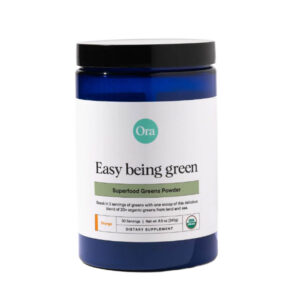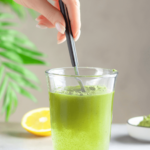Most Americans don’t eat nearly enough vegetables. In fact, according to the Center For Disease Control (CDC), only 9% of adults eat the recommended amount of vegetables.[1] Big yikes. Hence the popularity of nutrient-dense, all-in-one greens powder. A lot of them make very bold health claims… are healthy greens powders all that they’re cracked up to be? Is the most popular Athletic Greens AG1 worth it?
Keep reading to learn more about the best greens powders!
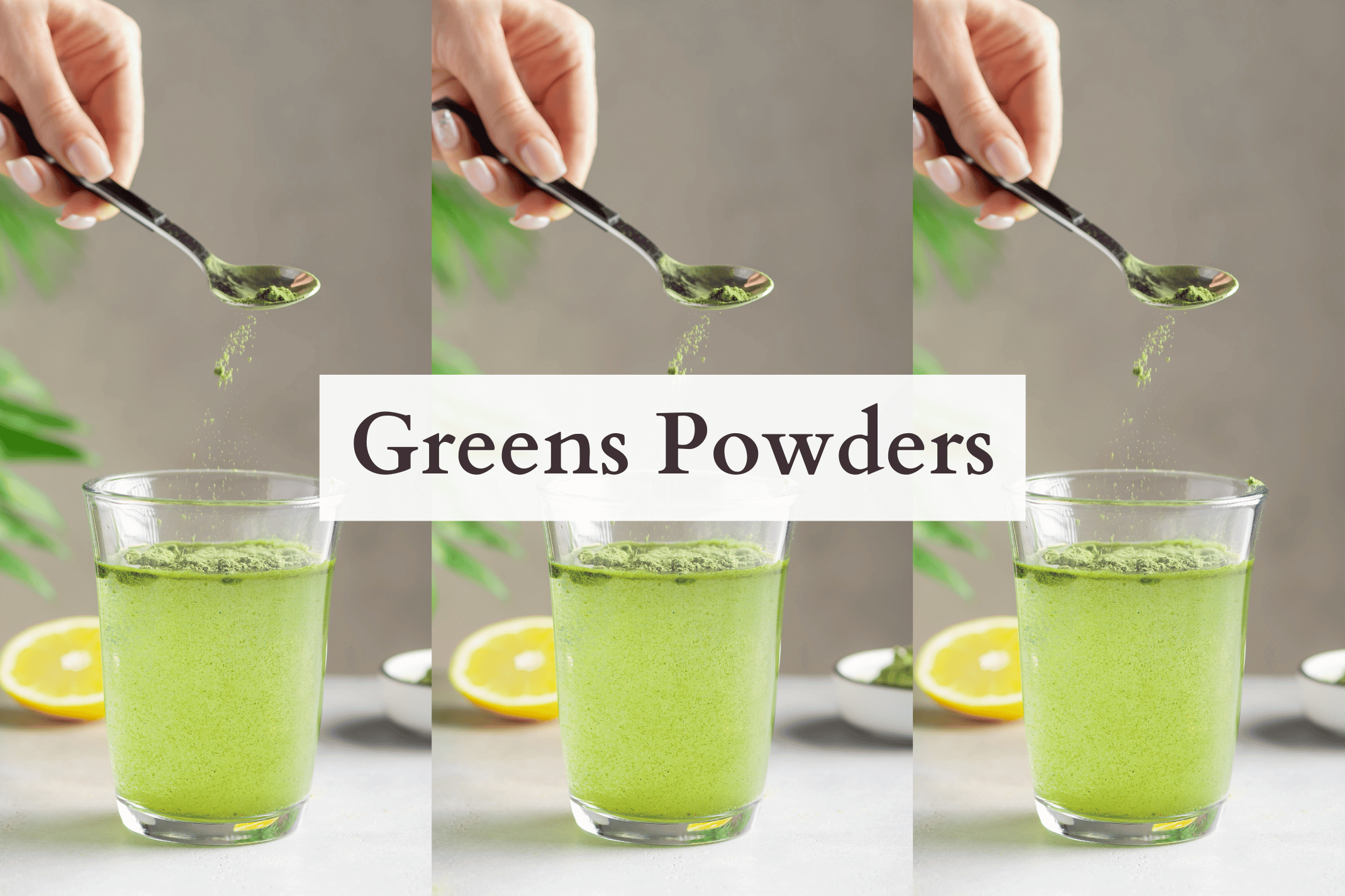
Note: This article contains affiliate links, meaning In On Around will make a small commission at no additional cost to you. This helps me maintain the site. As always, I value full transparency & only work with brands I love and trust.
What Are Greens Powders?
Green powders are dietary supplements that contain a concentrated blend of various green vegetables, fruits, and other plant-based ingredients. They are typically made by drying and pulverizing these ingredients into fine powder.
Green powders are often marketed as a convenient way to increase your intake of nutrients, vitamins, minerals, and antioxidants. They can be mixed with water, juice, or added to smoothies to provide a quick and easy boost of nutrition. However, it’s important to note that the effectiveness of green powders can vary, and they should not be considered a substitute for a well-rounded diet.
Supplements are not regulated as heavily as other products, like medications, so it’s essential to do your due diligence to ensure you’re consuming a high-quality product.
What Is Athletic Greens?
Athletic Greens, also known as AG1, is a very popular greens powder that’s been in the limelight lately. It has a large influencer following and even has television commercials. It’s intended on being a nutrient-dense supplement with over 75 vitamins and minerals from whole foods. More on Athletic Greens later – keep reading to learn more.
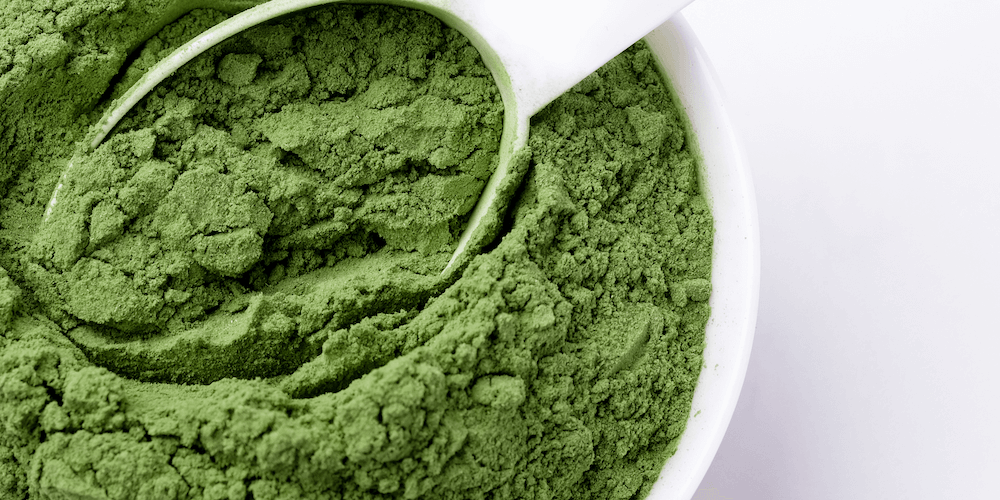
What Are The Potential Health Benefits & Risks Of Greens Powders?
These concentrated blends of plant-based ingredients have gained popularity as a convenient way to enhance nutrient intake, but it is important to understand both the potential advantages and considerations before incorporating them into your diet.
Pros Of Green Powders
Since greens powders are concentrated sources of nutrients that are easy to consume, they can potentially…
- Improve energy
- Optimize gut health, like improve bloating
- Support immunity
- Help you consume more fruits/vegetables (especially while traveling)
Brands will claim a plethora of health benefits, especially if they include a lot of ingredients. Take it with a grain of salt.
Cons Of Green Powders
While there are some potential pros, like other supplements, greens powders can pose some risks.
- Potential to be a concentrated source of toxins, like heavy metals
- Can be expensive
- Does not replace a healthy diet
- They’re certainly NOT a substitute for real, organic whole fruits & vegetables
- Most do not contain iron or vitamin D
- Does not include fiber, which is essential in a healthy diet
- Many brands do not disclose their exact ingredient amounts because they’re “proprietary” blends
- Can contain poor-quality ingredients and additives
- May cause gastrointestinal upset in some people
The quality and effectiveness of different brands and formulations can vary significantly, so it’s crucial to choose reputable products and consult with a healthcare professional if you have any specific health concerns or conditions.
Should You Drink Greens Powders On An Empty Stomach?
Whether to consume greens powders on an empty stomach depends on personal preference and individual digestive tolerance. Some people find that taking green powders on an empty stomach allows for better absorption and utilization of nutrients.
However, others may experience digestive discomfort or irritation when consuming them without food. It’s recommended to experiment and listen to your body to determine what works best for you.
Check Out The In On Around Shop
Can You Use Greens Powders While Pregnant Or Breastfeeding?
No, it’s best to avoid consuming greens powders while pregnant or breastfeeding. During pregnancy, it is advisable to avoid consuming certain greens found in green powders, such as alfalfa, ashwagandha, triphala etc…, as they may pose potential risks.
Additionally, some ingredients in these powders might have an impact on milk supply for breastfeeding mothers. Always speak with your doctor first, but best to err on the side of caution.
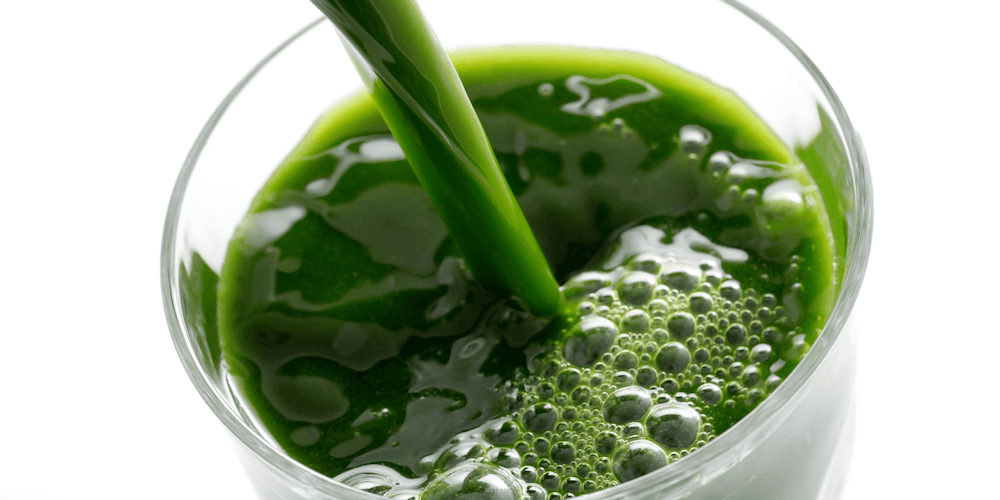
Who Should Avoid Greens Powders Like Athletic Greens?
It is important to discuss who should exercise caution or avoid using green powders…
- Those who have specific vitamin deficiencies – instead, work directly with your doctor to target those deficiencies
- If you’re on certain medications that can be impacted by herbs
- People on hormonal birth control, antibiotics, thyroid hormones, antidepressants, immunosuppressants, blood thinners, diabetic medication, etc… should especially use caution.
- If you’re pregnant or breastfeeding
- Those with certain medical conditions, like autoimmune conditions (ex: Lupus) or kidney disease
- Some ingredients like alfalfa can impact these conditions
- Children
- If you’re taking other supplemental vitamins (be careful not to take too much)
- If you’re avoiding caffeine
- Many greens powders contain ingredients with caffeine, like green tea or cacao, so keep this in mind.
Speak with your naturopathic or functional doctor before adding a greens powder to your supplement routine.
What To Look For
When shopping for a high-quality greens powder, look for the following:
- USDA-certified organic
- Low levels of heavy metals
- This requires the review of a Certificate of Analysis (COA).
- Oftentimes, companies will just show “pass” or “fail” for their heavy metal levels if they’re within the federal guidelines. It’s always best to see the exact numerical test result instead.
- Free of added sugar, artificial flavoring, colorants, or sweeteners
- Stevia-free
- You can read more about the pros & cons of stevia here: Is Stevia Safe During Pregnancy… Or At All?
- Full transparency with ingredient quality and testing
- Gluten-free
- In compliance with Proposition 65
- Due to naturally occurring heavy metals, if the company does business in California, you can expect to see a Proposition 65 warning label. This is why it’s essential to look into the COA.
- Keep in mind, some companies are exempt from the Proposition 65 warning label. You can read more about the regulation and it’s intricacies here: What Is Proposition 65 In California? Prop 65 Explained
- A diverse blend of vegetables, herbs, mushrooms, adaptogens, etc… but not too much.
- You don’t want to watering down its quality with poor-quality ingredients or too many ingredients. (I prefer blends that contain no more than 20 ingredients)
- One where you like the taste
- Many of these powder brands have an acquired taste
Red Flags To Be Aware Of
If a greens powder website mostly promotes its “key ingredients” instead of the full ingredient list, it’s a major red flag. Always look at the complete ingredient list. Deceptive marketing terms like “100% natural,” “toxin-free,” “heavy metal free,” etc. are also red flags. If it seems too good to be true, it probably is.
Most greens powder companies don’t disclose the quantity or percentage of each ingredient, so it’s difficult to know if the quantity consumed will make any difference. Keep this in mind when shopping. While “75+ fruits and vegetables” sounds great on the package, you’re likely consuming a very small amount of each ingredient.
When consuming greens powders, more is not always better. Don’t overdo it. Only consume one scoop per day or less (whatever is listed on the ingredient label).
Lastly, if a brand claims to be “heavy metal free,” that’s a red flag. There will always be some level of naturally occurring heavy metals. Ideally, we want low levels, but it will never be zero.
Beware of brands that claim to be third-party tested yet refuse to share the test results. Major red flag.
Greens Powders: Best, Better, Worst
I asked 23,000+ followers on Instagram for a list of brands they’d like more information on. I’ve summarized the most requested responses below. I reached out to each company requesting a Certificate of Analysis and gave them two weeks to respond.
Brands that look to have good ingredients, but didn’t send a COA, will be under the “Okay” section. If a company requested me to sign a Non-disclosure Agreement (NDA), they would also fall into this category because NDAs do not represent ingredient transparency.
Brands with poor-quality ingredients will fall in the “worst” category. If companies get back to me after the two-week window, those updates will be noted in the article.
If a brand claims that a COA is “proprietary information,” they are not being transparent. The levels of heavy metals and microbial contamination are NOT brand secrets. All greens powders will contain some level of heavy metals.
To clarify, some Certificates of Analyses will use measurements like ug/day or mcg/serving. Ug and mcg both stand for microgram. One microgram is one-millionth of a gram and one-thousandth of a milligram.
Keep in mind, this review is based on ingredient quality. The product’s taste will be tolerated differently per person. Some people like strong greens powders, while others prefer a more muted taste. This will require some trial and error to find a greens powder that you personally like. Prices and information were pulled in June 2023, so please check the most recent prices before purchasing as they may have changed.
The Top Three: Best Greens Powder Brands
1 – Organifi Green Juice
Pros:
- COA is also available directly on their website – great transparency!
- USDA-certified organic, non-GMO, Glyphosate Residue Free, Gluten Free, Vegan, and Kosher. Includes 11+ ingredients in the greens and superfood blends.
- According to their website, all products are produced in a GMP-certified facility, meaning that they’re made in an FDA-approved facility. Each batch must pass microbial testing before any product is allowed to be released into the marketplace. Every batch is also tested for heavy metals and aligned with California’s exclusive Prop 65 regulations.
- They work with third-party laboratories like Europhins, ABC Testing, Micro Quality Labs.
Price: $70 for 30 servings ($2.33/serving)
Number Of Ingredients: Contains over 12+ ingredients
Cons: Includes undisclosed natural flavors and monk fruit extract (which some people like to avoid). Contains tree nuts, so those who are allergic should avoid this product.
According to their Certificate of Analysis (COA) for the greens powder manufactured on October 1, 2021: [2]
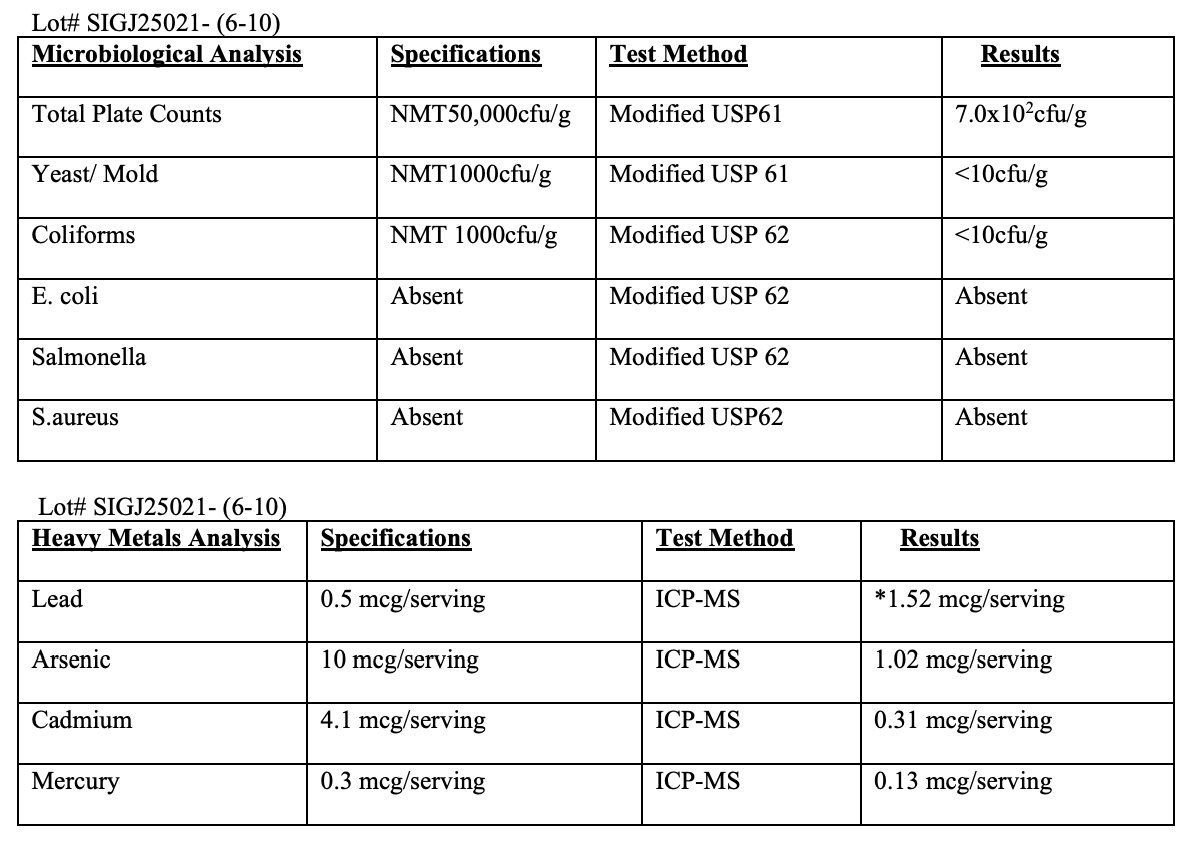
2 – Ora Organics: Easy Being Green Superfood Greens Powder
Pros:
- COA is available directly on their website – great transparency!
- USDA-certified organic, Soy-free, Vegan, Gluten-free, etc…
- They test every product batch for:
- Ingredient Potency
- Heavy Metal Content
- Microbial Contaminants
- Pathogens
- They also screen their products for:
- Supplement Fact Verification
- Pesticides
- Allergens (including gluten, dairy, peanut, and soy)
- They use the testing standards established by both the United States Pharmacopeia and the European Commission for Food. They’ll use third-party laboratories, like Eurofins, JK BioScience Analytical Laboratories, American Testing Laboratories, and Venture Laboratories.
Price: $35 for 30 servings ($1.16/serving)
Number Of Ingredients: Made with over 20 high-quality ingredients.
According to their Certificate of Analysis (COA) for the greens powder manufactured on August 1st, 2022: [3]


3 – Cymbiotika: Super Greens With Chlorophyll
While they’re not certified organic, they shared their Certificate of Analysis from May 2022 and they incorporate many organic ingredients.
Pros:
- Made with 7+ ingredients. Available in a pouch/liquid formula, instead of a powder formula.
- Free of synthetics, GMOs, fillers, chemicals, artificial preservatives, or additives.
Price: $78 for 30 packets ($2.6/serving)
Number Of Ingredients: Contains over 7+ ingredients
Cons: COA is not readily available on their website. Contains cassava syrup (contains natural sugar). Not certified organic.

5 “Okay” Greens Powder Brands
These greens powder brands don’t meet our standards for the “best” category. While their certified organic ingredient list looks good, they did not provide a Certificate of Analysis. If they’re not willing to be transparent with their ingredients, it’s impossible to know if they’re using high-quality ingredients or how high their heavy metals are.
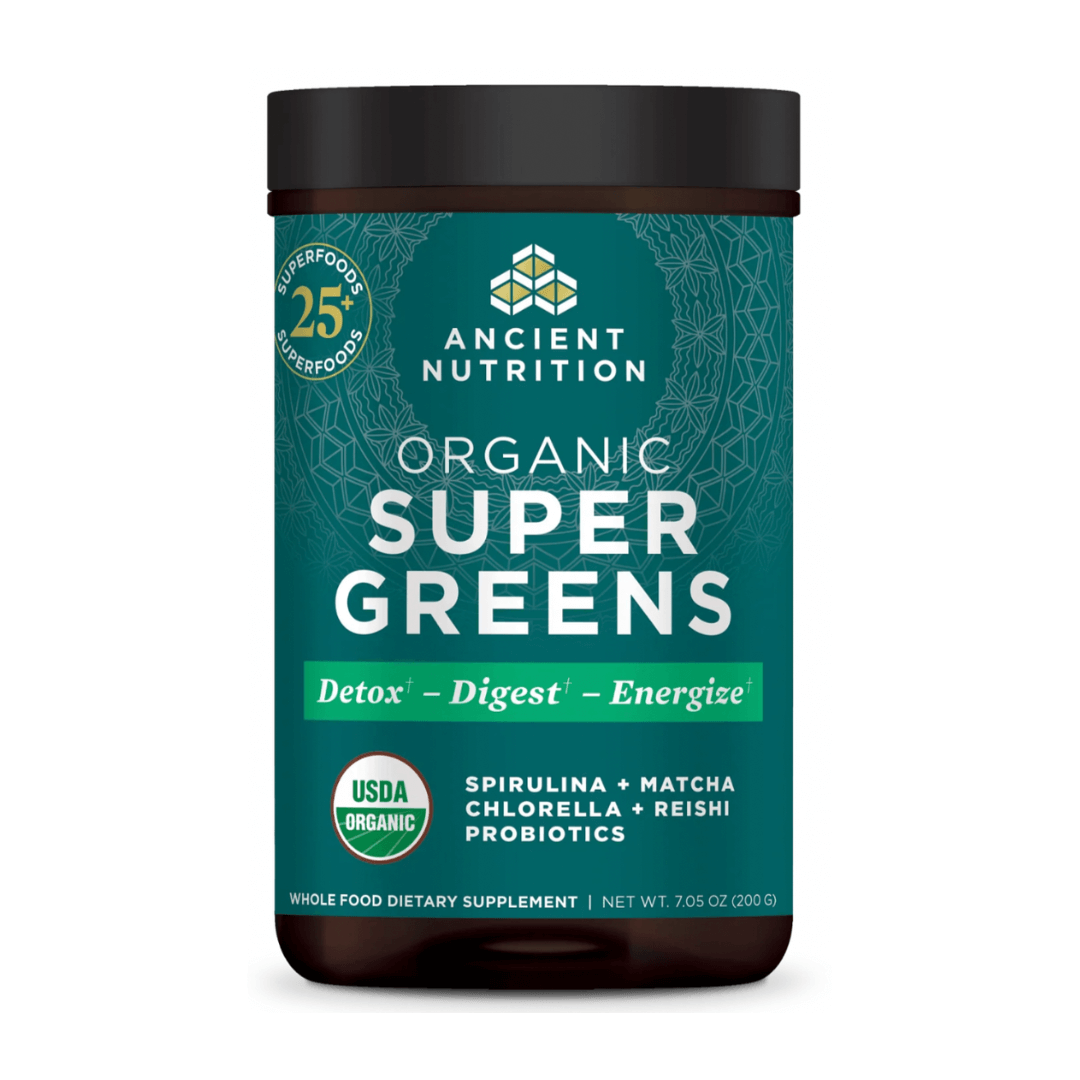
1 – Ancient Nutrition: Super Greens (By Dr. Axe)
They would not provide testing results claiming it’s “proprietary information.”
Pros:
- USDA-Certified Organic, Gluten Free, Kosher, Soy-Free
- Includes a mix of greens, veggies, fruits, digestive health enzymes, fermented botanicals, and mushrooms
- Uses clinically studied ingredients, meaning the ingredients have been backed by peer-reviewed studies and tested for efficacy, safety, transparency
- Includes the probiotic strain Bacillus coagulans, which is a soil-based organism
- According to their customer service team, “We ensure that all of our products meet the established specifications and require a Certificate of Analysis (CoA) for every lot manufactured.”
Price: $45 for 25 servings ($1.80/serving)
Number Of Ingredients: Made with 25+ superfoods
Cons: COA is not readily available on their website.

2 – Your Super: Super Green Superfood Smoothie Powder
They would not share the Certificate of Analysis for the Super Greens. Instead, they only shared COAs from 2021 for four other products, like their plant collagen. Apparently, their Food Quality team is working to share test results in a “digestible way” in the near future – so their ranking may change if the results are transparent and unadulterated.
Pros:
- USDA-Certified Organic, Gluten-free, No artificial sweeteners
- Transparent on the country sourcing per ingredient. Available on their website:
- Wheatgrass from USA
- Barley Grass from USA
- Moringa from India
- Baobab from Ghana
- Spirulina from Chile
- Chlorella from Portugal
- Claims that each batch is 3rd party tested for quality
Price: $30 for 30 servings ($1/serving)
Number Of Ingredients: Contains only 6 ingredients
Cons: COA is not readily available on their website.

3 – Garden of Life: Raw Organic Perfect Food Green Superfood Original Powder
They would not provide testing results claiming it’s “proprietary information.”
Pros:
- USDA-Certified Organic, NSF-certified, Gluten-Free
- Free of stevia
- “We ensure all our products meet the established specifications and require a Certificate of Analysis (CoA) for every lot manufactured. The products are also 3rd Party Tested to ensure what we claim on the label is actually in the product.”
Price: $49 for 30 servings ($1.63/serving)
Number Of Ingredients: Contains over 40+ ingredients
Cons: COA is not readily available on their website. Garden of Life is a company owned by Nestle.
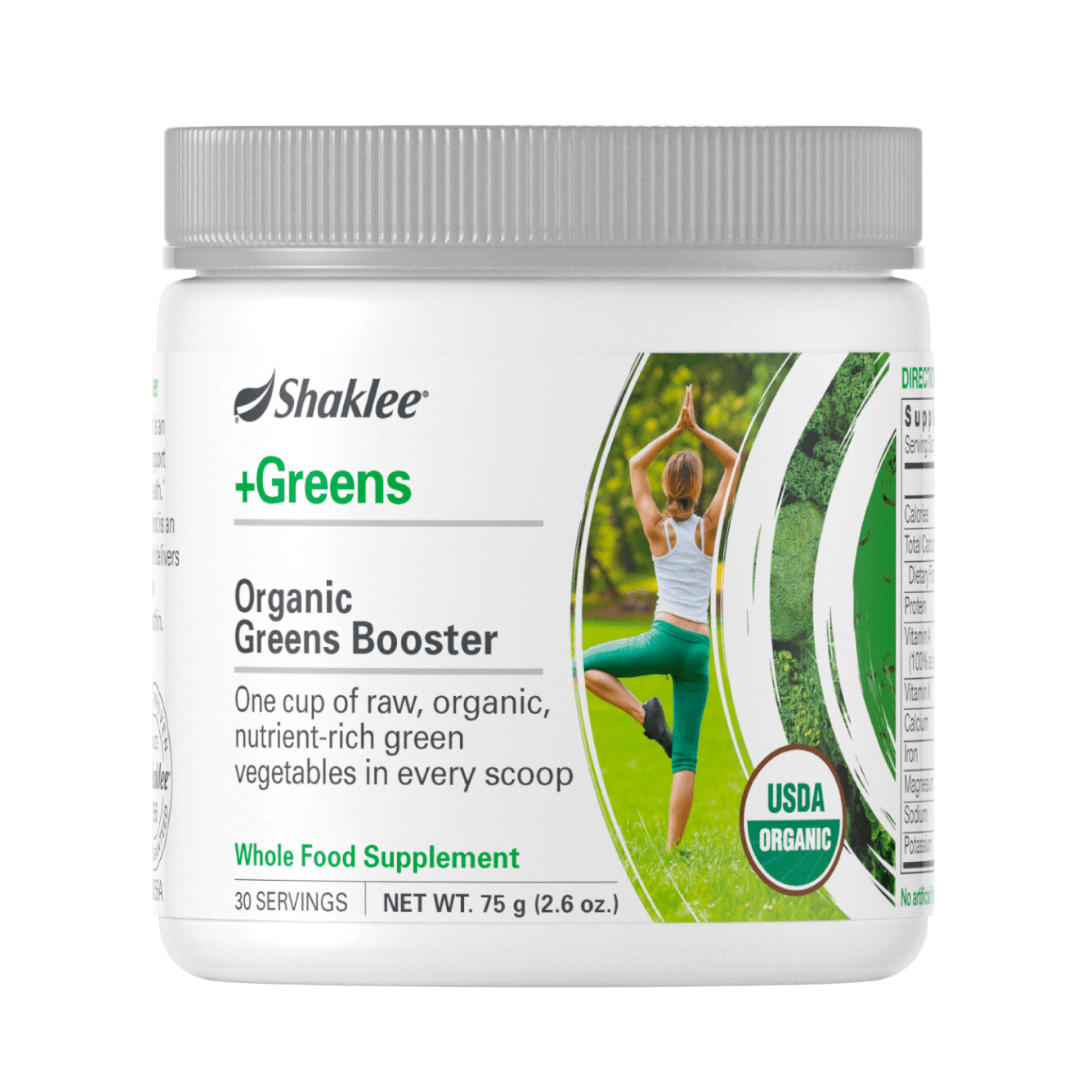
4 – Shaklee: Organic Greens Booster
They did not respond or provide testing results.
Pros:
- USDA-Certified Organic, Gluten-free, Kosher, and free of artificial colors, sweeteners, flavorings, and preservatives.
Price: $32 for 30 servings ($1.1/serving)
Number Of Ingredients: Contains only 3 ingredients.
Cons: COA is not readily available on their website. Only a blend of about 3 different greens (kale, spinach, broccoli sprout)

5 – Sunfood: Organic Supergreens
They did not respond or provide testing results.
Pros:
- USDA-Certified Organic, Gluten-Free
- Contains probiotics and enzymes
Price: $33 for 22 servings ($1.5/serving)
Number Of Ingredients: Contains over 19+ ingredients
Cons: COA is not readily available on their website.
14 Worst Greens Powder Brands
These are brands that we would personally avoid. These brands either:
- Include ingredients that don’t meet our criteria
- Use stevia (read more about stevia here)
- Are not certified organic
Will consuming these “worst” brands every once in a while make a major difference in your health? Likely no. But if you’re including a supplement in your diet, it should be the highest quality possible.

1 – Athletic Greens: AG1
They did not respond or provide testing results.
Hate to be the bearer of bad news… but it’s not worth the hype!
Pros:
- Made with 75 vitamins, minerals, and whole-food sourced nutrients – some people claim that this is a more diverse blend
- Free of artificial colors, flavors, preservatives, and sweeteners
- Tested for heavy metals and NSF-certified
- Combines a blend of raw superfoods, herbs, digestive enzymes, mushrooms, probiotics, and more.
Price: $79 for 30 servings ($2.63/serving)
Number Of Ingredients: Contains over 75+ ingredients – this is actually not a good thing.
Think critically about it: consolidating over 75 ingredients into a powder the size of a teaspoon. How much of each ingredient are you really consuming? Not much at all… but we simply wouldn’t know because the company doesn’t disclose the percentages of each ingredient.
Cons: COA is not readily available on their website. Not certified organic. Contains undisclosed natural flavors, stevia, and ingredients with caffeine. Uses four proprietary complex blends, but we don’t know the quantity or percentage of each ingredient in the blend. Contains ingredients (like lecithin forphosphatidylcholine) that are derived from soy. There’s also no way to know if the probiotics are still stable in powder form.
Athletic Greens has a very large marketing budget (hence the TV commercials) and they’re backed by large investors like SC. Holdings and Bolt Ventures.
There are better greens powders on the market than Athletic Greens.

2 – Amazing Grass: Greens Blend – The Original
They would not provide testing results.
Pros:
- Uses organic ingredients. Gluten-free, No added sugar
- Offers both powders and capsules
Price: $40 for 30 servings ($1.3/serving)
Number Of Ingredients: Contains over 20+ ingredients
Cons: COA is not readily available on their website. Not certified organic. Contains silica (silicon dioxide), which some people prefer to avoid.

3 – Sunwarrior: Ormus SuperGreens
They would not provide testing results claiming it’s “proprietary information.”
Pros:
- USDA-certified organic, Gluten-free, Soy-free, Free of added sugar
- Offers both an unflavored and mint version
- More affordable
- Offers a blend of greens, herbs, and probiotics
- Tested products in a 3rd party lab at the time of receipt and after finished good production (although they don’t share the results)
Price: $34 for 45 servings ($0.75/serving)
Number Of Ingredients: Contains over 13+ ingredients
Cons: COA is not readily available on their website. Contains stevia.
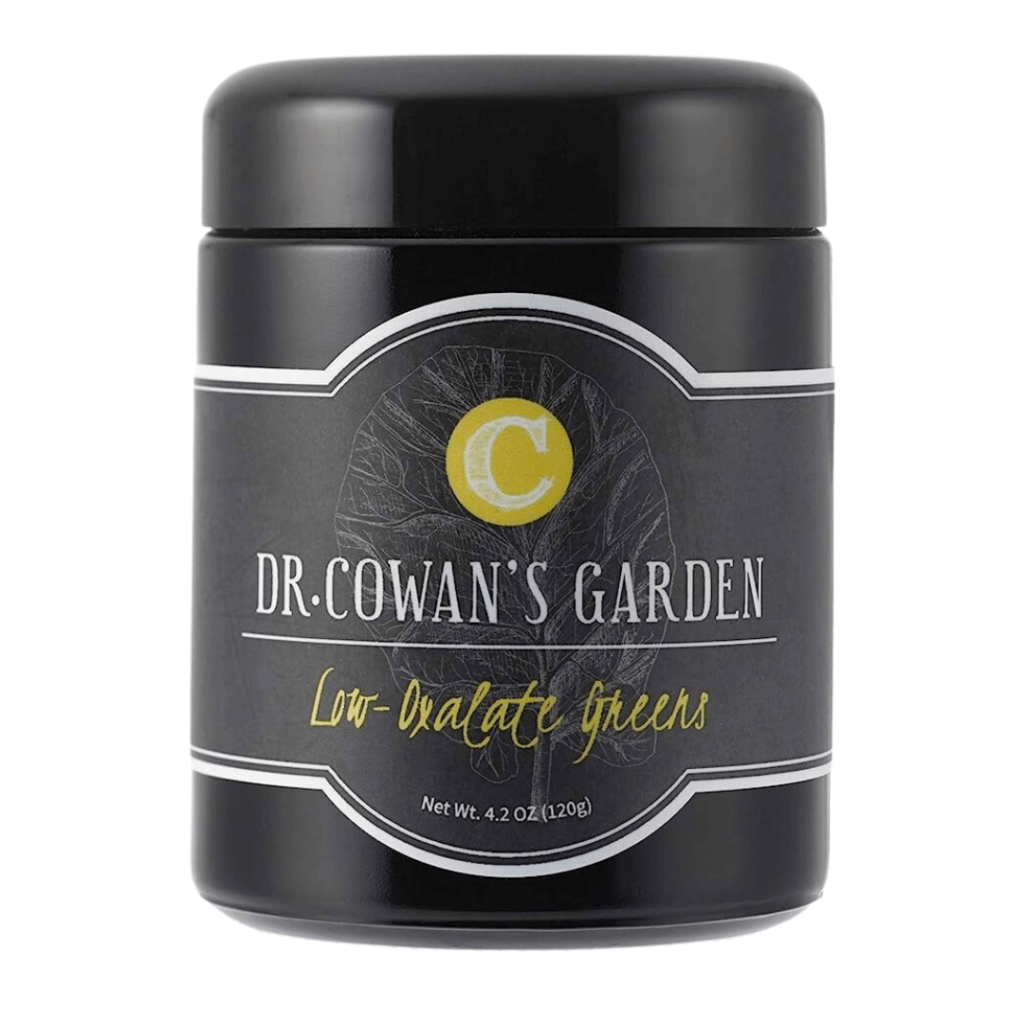
4 – Dr. Cowan’s Garden: Organic Low-Oxalate Greens Powder
They do not have a Certificate of Analysis for vegetable powders, so there’s no way to know the levels of heavy metals in the product.
Pros:
- Uses organic ingredients
- According to their customer service: “Our products are “Beyond Organic”, grown domestically by small family farms or sustainably foraged. Our vegetables, grains and legumes are domestically grown in the U.S. by small family farmers who are, at a minimum, growing organically. Most are either Demeter-certified, working toward certification, or utilize most of the biodynamic farming principles (sometimes referred to as “regenerative farming”) that nurture the health of the soil to produce superior, nutrient-dense vegetables. Some products, such as Chaga Nuggets and Wild Ramps, are wild foraged using sustainable harvesting practices.”
Price: $45 for about 50 servings ($0.9/serving)
Number Of Ingredients: Contains only 3 ingredients.
Cons: COA is not readily available on their website. Not certified organic. Only made from 3 ingredients – kale, mustard leaves, and collard greens.

5 – Thorne: Daily Greens Plus
They would not provide testing results.
Pros:
- Contains a unique blend of adaptogens and mushrooms.
- According to their website, “If a Thorne product contains a naturally-occurring chemical in an amount that is above a Proposition 65 threshold, then we will place the appropriate warning notice on the product label. [4]
Price: $68 for 30 scoops ($2.26/serving)
Number Of Ingredients: Made with 28+ ingredients, which is a mixture of greens, mushrooms, adaptogens, and antioxidant blends.
Cons: COA is not readily available on their website. Not USDA-certified organic. Includes monk fruit (which some people prefer to avoid).
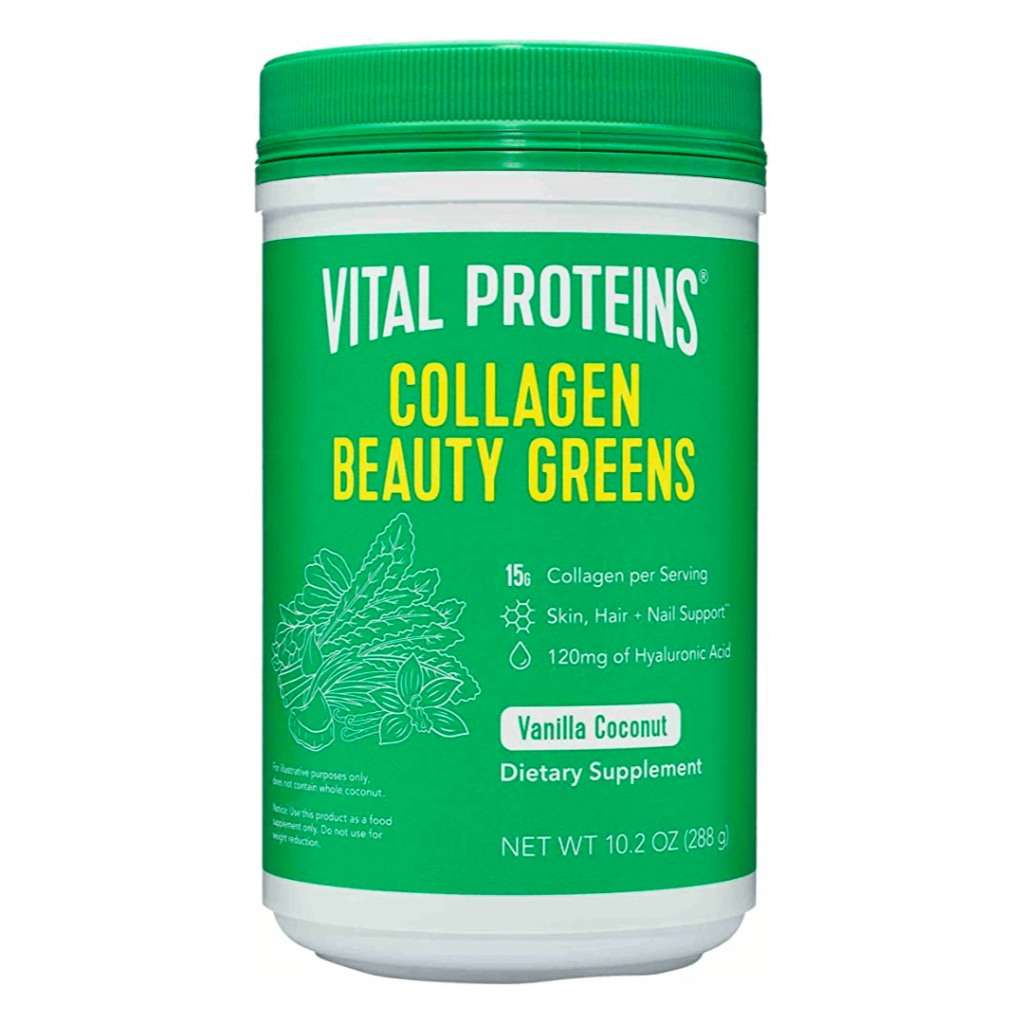
6 – Vital Proteins: Collagen Beauty Greens
They would not provide testing results due to reasons “outside of our control.”
Their customer service team said: “For contractual reasons outside of our control, we are unable to forward laboratory paperwork to you, but stand by our heavy metals statement. We rigorously test our raw materials and finished products to ensure they are in full compliance with the standards of Prop 65 and the National Science Foundation (NSF).”
Pros:
- Contains 12g of collagen per serving
- Uses organic ingredients
Price: $28 for 12 servings ($2.33/serving)
Number Of Ingredients: Contains over 8+ ingredients
Cons: COA is not readily available on their website. Not USDA-certified organic. Many people complain about the taste in the website’s review section.
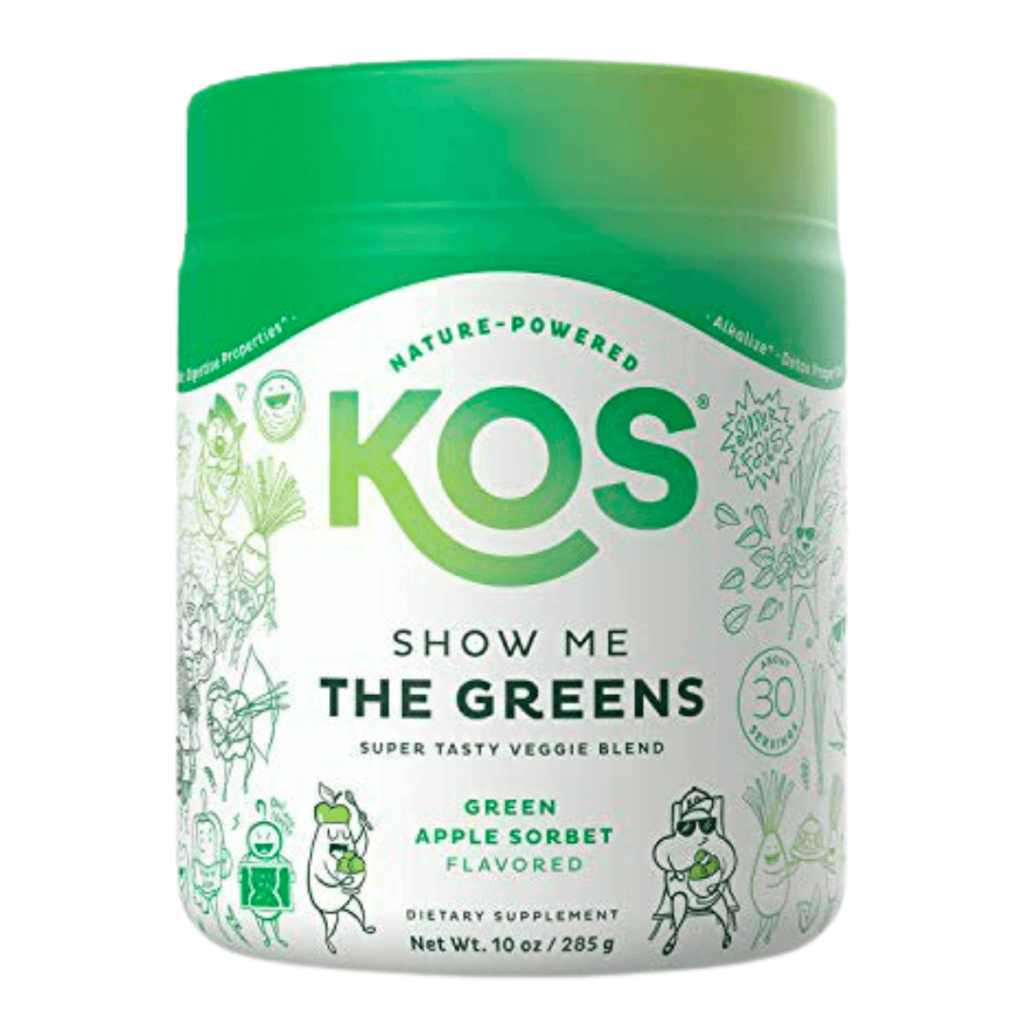
7 – KOS: Show Me The Greens
They did not respond or provide testing results.
Pros:
- USDA-certified organic, Produced in an NSF-certified facility, Gluten Free, Soy-Free
- Includes a mix of algae, alkalizing greens, fruits, veggies, and digestive prebiotics.
Price: $39 for 28 servings ($1.4/serving)
Number Of Ingredients: 13+ ingredients
Cons: COA is not readily available on their website. Contains stevia and monk fruit.

8 – 1Up Nutrition Greens & Reds
They did not respond or provide testing results.
Pros:
- Uses organic ingredients. Gluten-free, Soy-free, Free of artificial colors
Price: $56 for 30 servings ($1.9/serving)
Number Of Ingredients: Contains over 19+ ingredients
Cons: COA is not readily available on their website. Not certified organic. Contains stevia.
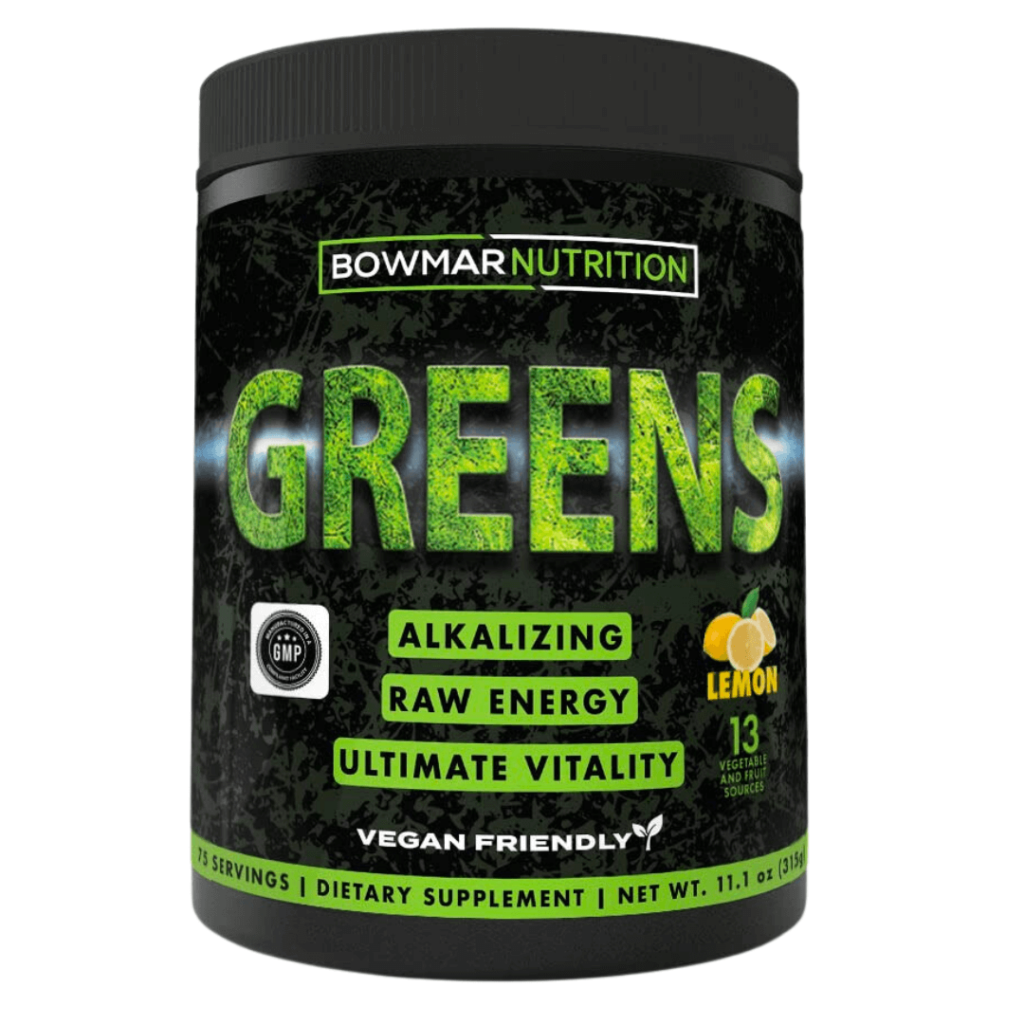
9 – Bomar Nutrition: Greens
They did not respond or provide testing results.
Pros:
- USDA-certified organic, Gluten-Free
- More affordable option per serving
- Offered in three flavors: berry, lemon, or peach
Price: $45 for 75 servings ($0.6/serving)
Number Of Ingredients: Contains over 13+ ingredients
Cons: COA is not readily available on their website. Contains stevia and undisclosed organic flavoring. Bomar was sued in a class action for potentially claiming more protein than what’s on its label. [5]
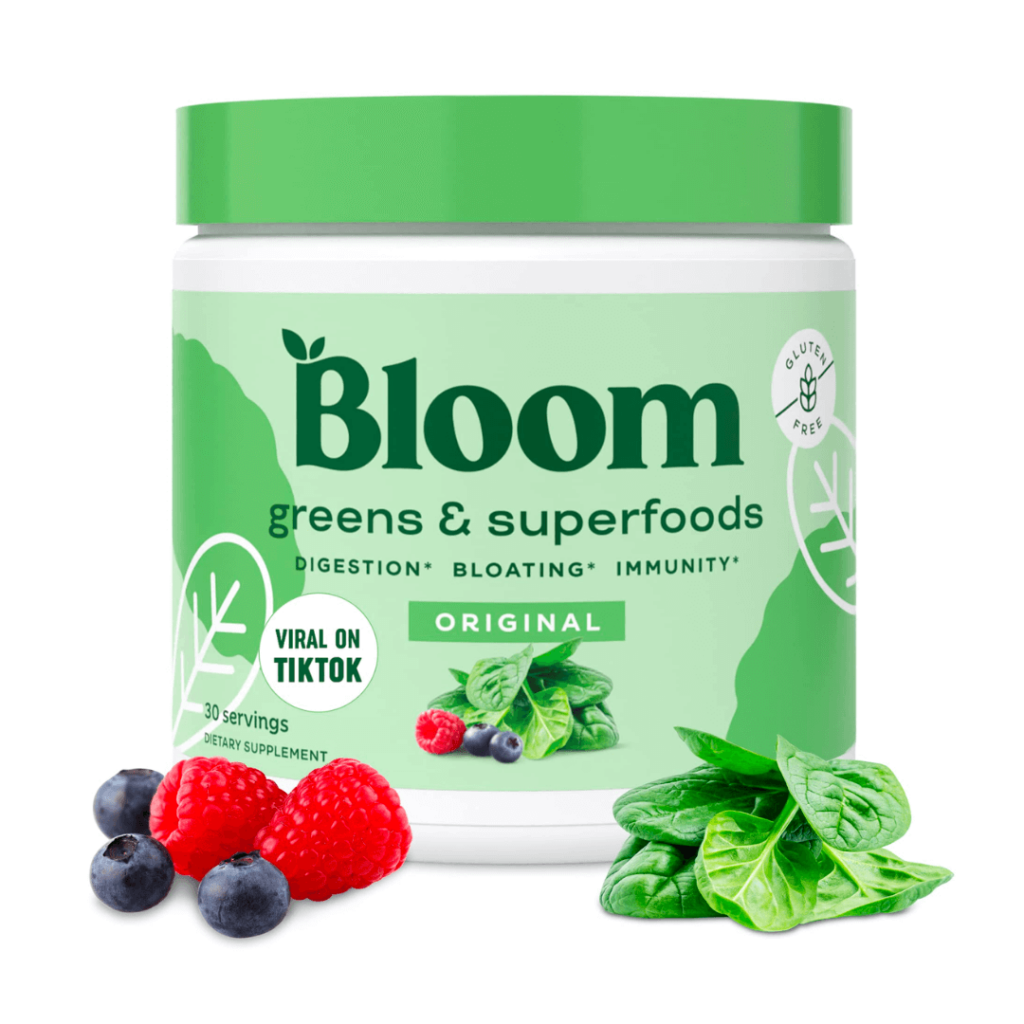
10 – Bloom Greens & Superfoods
Poor quality ingredients that don’t meet my standards.
- COA is not readily available on their website.
- Not certified organic.
- Contains stevia and maltodextrin
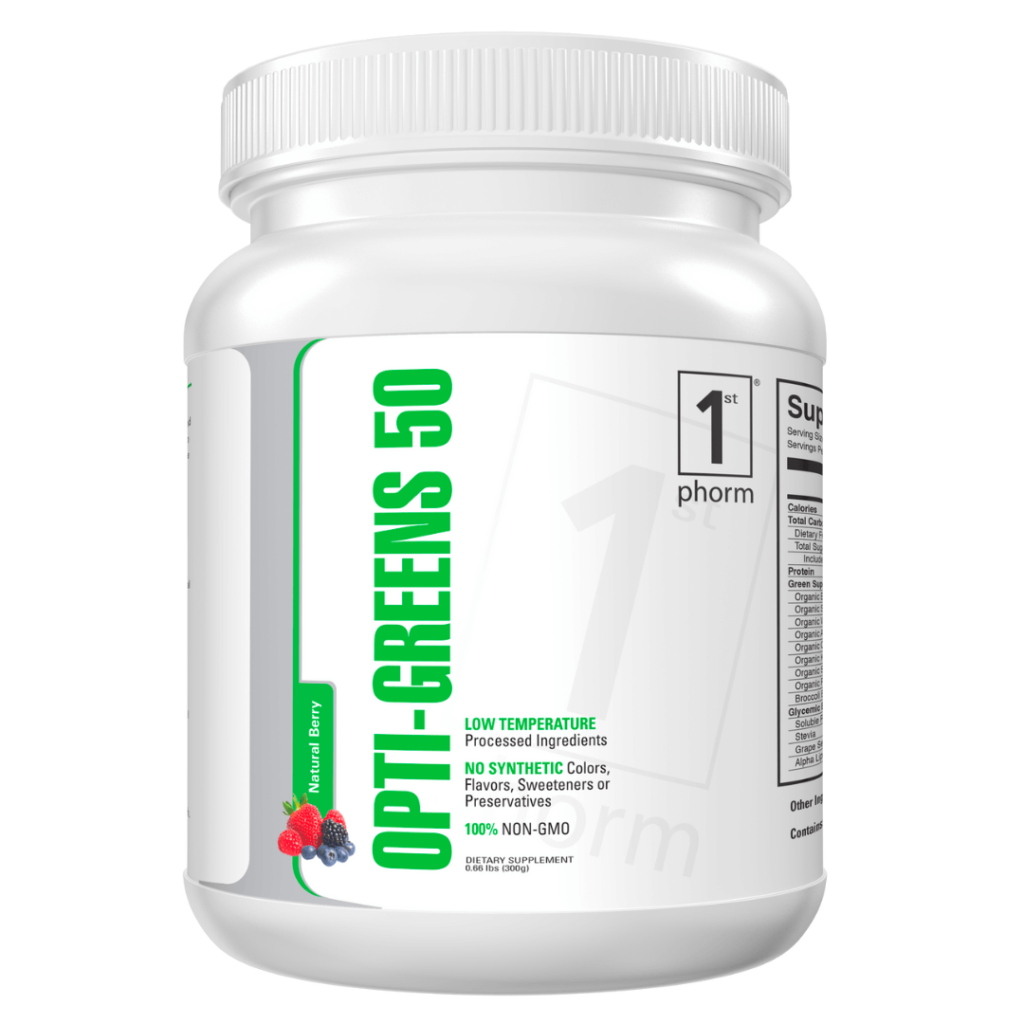
11 – 1st Phorm Opti-Greens 50
Poor quality ingredients that don’t meet my standards.
- COA is not readily available on their website
- Not certified organic
- Contains undisclosed natural flavoring and maltodextrin
- Contains stevia
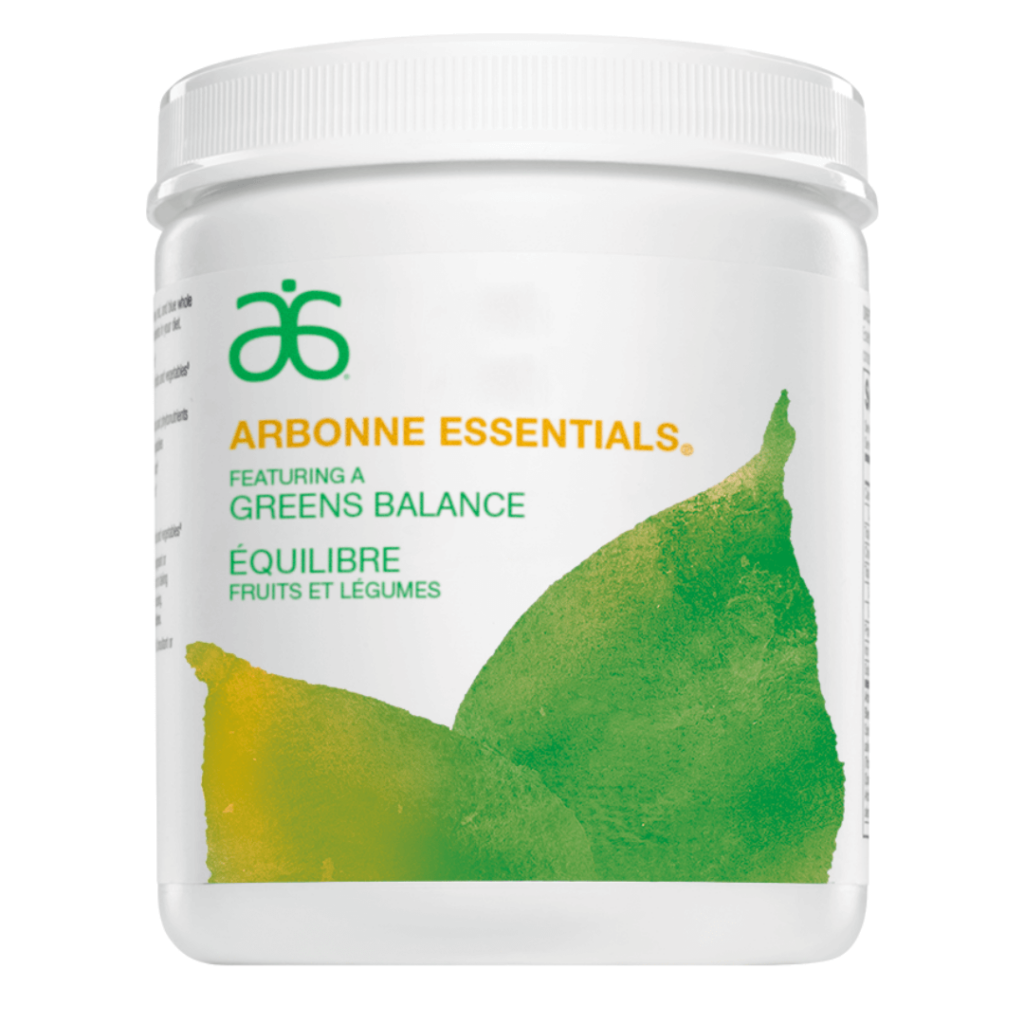
12 – Arbonne Greens Balance
Poor quality ingredients that don’t meet my standards.
- COA is not readily available on their website
- Not made with organic ingredients
- Contains added cane sugar
- Contains additives like silicon dioxide, which some people prefer to avoid
- Uses steviol glycosides/stevia
- This is a multi-level marketing company that I’m not a fan of whatsoever

13 – Root Brand: ReLive Greens
Poor quality ingredients that don’t meet my standards.
- COA is not readily available on their website
- Contains a proprietary blend of ingredients, so they will not disclose all ingredients
- Not certified organic
- Claims to be made from organic ingredients
- More expensive ($79 for 30 servings)

14 – Biohm: Super Greens With Probiotics
Poor quality ingredients that don’t meet my standards.
- COA is not readily available on their website.
- Not certified organic.
- Contains undisclosed natural flavors, stevia, monk fruit, silicone dioxide, gums, maltodextrin, and more.
Mixhers, Q Sciences, and other brands that aren’t organic would also fall into the worst category. This isn’t an exhaustive list – there are many, many more greens powders on the market.
Final Thoughts
High-quality organic greens powders can be helpful on days when you’re not consuming enough fruits & vegetables (like if you’re traveling). They’re certainly NO substitute for real, organic, whole foods. Requesting and analyzing each company’s Certificate of Analysis (COA) is crucial since greens powders can contain high levels of heavy metals. Remember, there’s no magic pill or powder… and the quality of your supplement is of utmost importance.
So all in all, is Athletic Greens worth it? Not quite. There are better options.
⬇ Pin this “Is Athletic Greens Worth It?” pic on Pinterest for future reference! ⬇
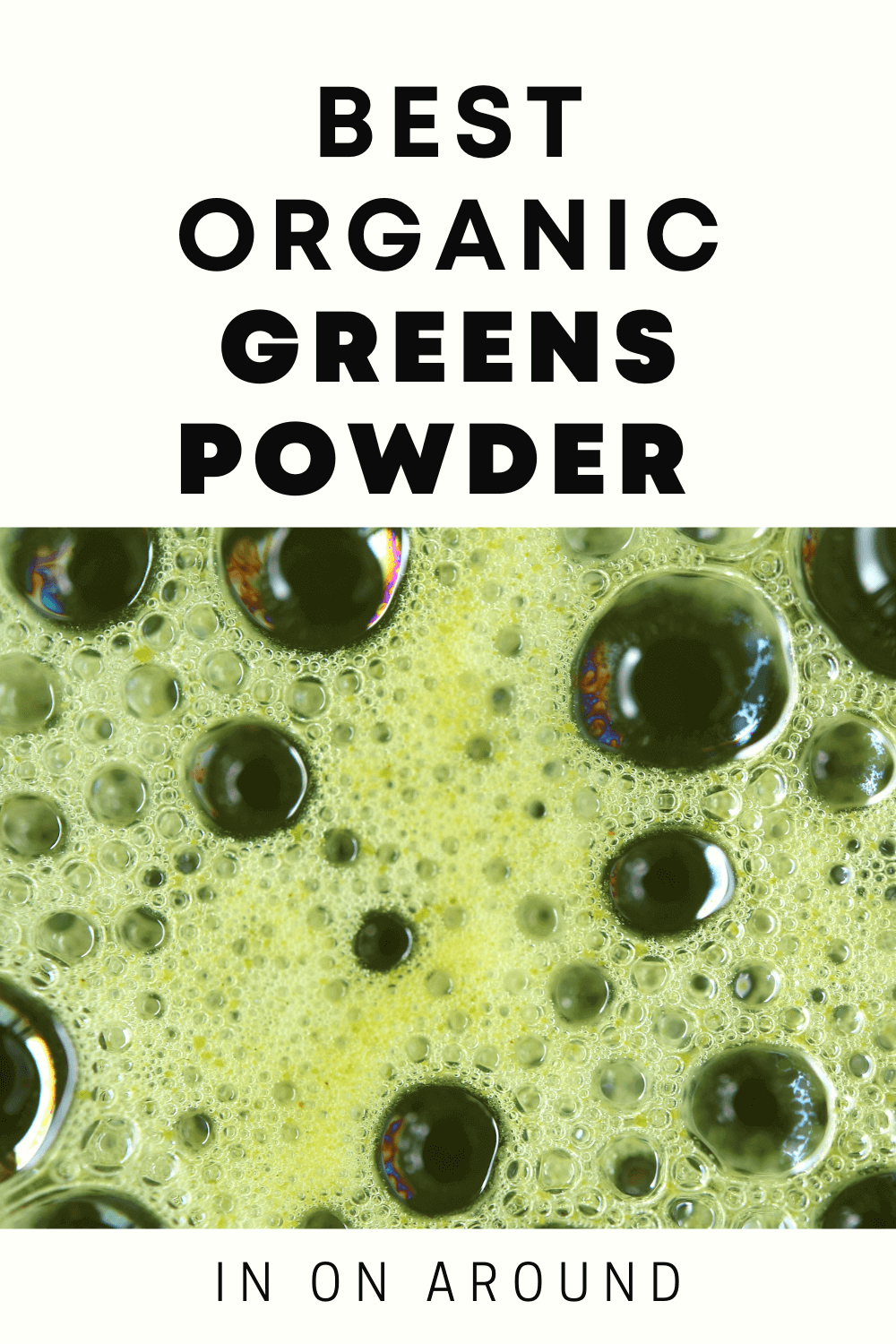
Frequently Asked Questions – Is Athletic Greens Worth It?
Click on the below FAQs to learn more about the health benefits of nutrient-rich superfood organic greens powders, plant-based natural ingredients, and sustainable sourcing.
Is Athletic Greens AG1 Worth The Price?
What are greens powders?
Are greens powder supplements healthy?
Can greens powder be dangerous to consume?
Do you use greens powders?
Let me know your thoughts and key takeaways in the comments below!
You can watch our web story here.
xoxo,

Want to read more? Check out my other articles here!
Other references on Is Athletic Greens AG1 Worth It?: Sports Illustrated, Consumer Lab, Healthline, Center TRT, Outlook India, Forbes Health, Nutrition To Fit, Front Office Sports, Life Hacker Guy, Wellness Verge,
Copyright In On Around LLC 2023 ©. The statements made on this website have not been evaluated by the FDA (U.S. Food & Drug Administration). They are not intended to diagnose, treat, cure, or prevent any disease. The information provided by this website should not be used as individual medical advice and you should always consult your doctor for individual recommendations and treatment. The information contained in this site is provided on an “as is” basis. Related to this site, there are no guarantees of completeness, accuracy, usefulness, or timeliness. In On Around LLC assumes no responsibility or liability for any errors or omissions in the content of this site.


